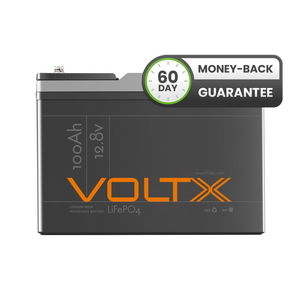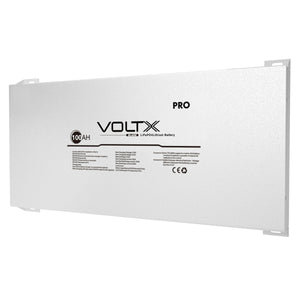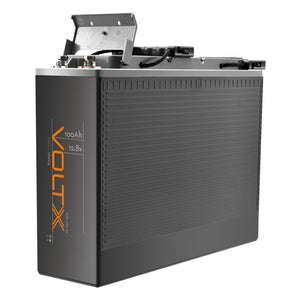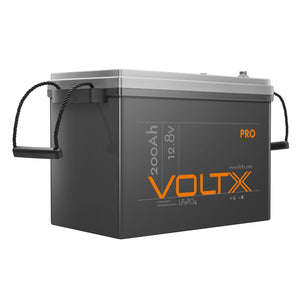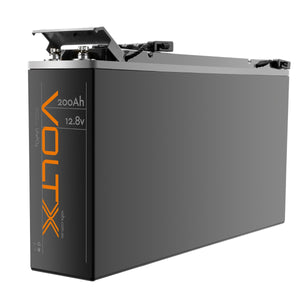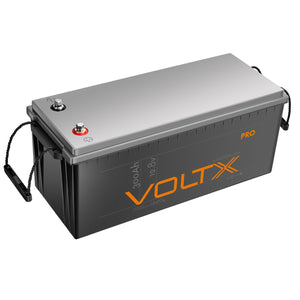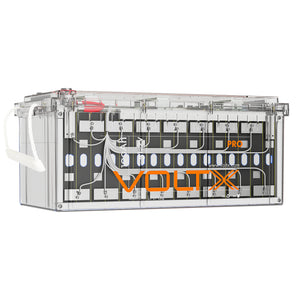VoltX 12V 300Ah Pro Lithium LiFePO4 Battery
Was$1,499.00Now $1,124.25Unit price /UnavailableVery low stock
Buying new batteries can both be tricky and expensive. Seasoned campers and experienced battery users would have an idea of which power pack to use for every type of application, but newbies in the camping scene may need more help in choosing their first battery. There are so many to choose from plus several factors to consider, which can cause issues if not taken into account.
A new battery may or may not be pricey depending on what type you get. However, whether you're choosing a new camping battery, a new car battery, or a new iPhone battery, you want to make sure that what you get will give you great value. A faulty battery is not just an inconvenience-it's also a waste of money and can even be harmful at times.
If you're thinking of getting new batteries for your future adventures, do your research first. Learn more not just about the battery types and what to look for, but also where to buy them. Battery providers play a crucial role in your power pack's overall quality plus, you never know-you might just stumble on some great deals from some battery shops!
How To Choose New Batteries For Camping?
Tent camping or staying in your RV both require reliable off grid batteries. You'll be out for a couple of days and may even have no access to a mains power if you choose to stay in a remote camping spot for extra peace. Zero power takes the fun out of an outdoor adventure, which is why it's important that new batteries for camping provide superior performance.
Here are some of the main factors you should check when buying new batteries for the outdoors:
Size and weight
Any outing would be easier with a lightweight portable battery. Carrying a bulky, heavy battery is quite tedious, particularly for trips that require a little bit of hike-you'll be exhausted by the time you get there! If you're installing your new battery in an RV, make sure that it fits well in whatever battery compartment you have there. Batteries come in a range of sizes anyway, so all you have to do is figure out how big you need in terms of dimensions.
Composition
Batteries can either be lead-acid, gel, or lithium-based. AGM batteries are the most popular in the lead-acid department and have their own perks but lithium is the gold standard when it comes to quality and performance. Among all rechargeable lithium batteries, the LiFePO4 batteries stand out the most with it its new battery technology that features a built-in BMS.
A BMS or battery management system ensures that every battery cell in your power pack is well-optimised for smooth operation. It also helps extend service life by protecting against usual battery issues including overcharging and short circuits. On top of these benefits, a LiFePO4 battery is lighter, packs more power, and does not explode nor catch fire for increased user safety, unlike lithium-ion batteries.
Lead acid, meanwhile, has been around for ages. A lot of outdoor enthusiasts still go for this battery composition mainly because it's the cheapest one. These are a little lagging in terms of most battery aspects though and would not really be a cost-effective choice for the long term despite their affordable price.
Voltage
Many campers opt for a 12 volt lithium battery or AGM battery when camping for a couple of days. This is the ideal size for most RVs and the ideal voltage output for most appliances on a weekend outing. However, if you need higher output you can always opt for 24V or even 48V batteries.
Capacity
Calculating your power needs is required before choosing the capacity of your new battery. A lot of adventurers go for a 100Ah lithium battery but if you're staying for longer in an off-grid camping spot or have extra appliances you want to run, you can go for a 200Ah lithium battery instead, pack another battery, or add solar panels to your current setup.
Worried about limited space? Try our famous VoltX slimline batteries at Outbax. We have a slimline lithium battery 200Ah here for increased capacity in space-savvy form. All our power packs are LiFePO4 based and are considered deep cycle batteries too, which are perfect for longer runtime with their 80% useable capacity.
Number of Outlets
You also need to consider electronics that you want to run simultaneously. You might want to heat your food with a microwave while charging your phone, so see to it that the number of outlets is suitable for your power needs, aside from capacity.
Where To Buy Quality New Batteries in Australia?
Aussies are known for their love for adventure, so buying new batteries here wouldn’t be a problem. One search for the “best camping batteries†or “best lithium batteries†would give you tons of information on both physical and online stores.
Perhaps a more pressing concern would be where to buy quality local batteries at a budget-friendly price. If this is the case, then Outbax is just the right shop for you. Visit us for proven and tested lithium deep cycle batteries at significantly lower costs plus incredible deals that you won’t find anywhere else! We even have battery and solar panel bundles for as low as $699 here!
How To Test New Batteries?
Both used and new batteries are often tested by checking their voltage level via a voltmeter. Another good tool to use with a multimeter, as this determines not just voltage but also current and resistance. You need to wait for a while before testing out a newly-charged battery though, in order to ensure an accurate reading.
Using a multimeter is pretty simple. First, select the dials-if it's a 12V system, you need to choose the DC voltage option but set it at a 20V range. Disconnect the battery from the circuit by removing the cables, plug the red lead into the VΩ port and the black lead into the COM port. Connect the negative terminal with the black lead and the positive terminal with the red lead, then check out the reading on the meter.
A 12V battery should read around 12.6V to 12.8V if it's fully charged and 12.1V if it's 50% charged. Anything lower than 11.9V means that your battery is not charged, while sudden voltage drops are an indication that you might have a faulty battery.
More from Outbax
Shop for impressive new batteries at Outbax now! Whether you need a lithium marine battery or lithium RV battery, you're sure to get one for any outdoor adventure you choose here. Need an extra power pack? You're in luck-you can get double batteries here for only $452! That gives you up to 50% of savings and twice the battery power for your next outdoor trip.
Order your battery today and have it delivered to your doorstep. Be it batteries in Gympie or batteries in Launceston, we'll bring that power pack to you in no time. Browse through our website for more portable power choices such as inverter generators.
